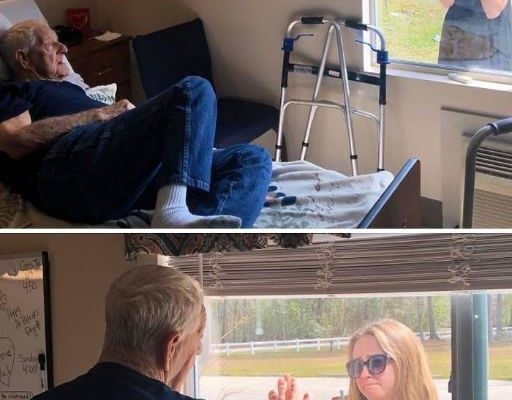When Forgiveness Finds You: A Daughter’s Last Goodbye at the Edge of Memory
He used to call me his little girl, even when I was pushing thirty and paying my own rent across town. We were close—deeply so—until a fight tore us apart. It wasn’t really about politics. It was about grief, control, and unspoken trauma. Two stubborn hearts who loved each other but didn’t know how to talk anymore.
That was six years ago. We hadn’t spoken since.
Then came the call from a senior care facility. A nurse explained my father had been admitted weeks ago. Early signs of dementia, compounded by a severe case of pneumonia. No visitors allowed due to short staffing. I hadn’t even known he’d left his house.
I drove there the next morning. My hands trembled like I was walking into a courtroom instead of a memory care center.
When he saw me outside the window, he just stared. I waved. He blinked. And slowly—deliberately—sat up.
That moment broke me.
He didn’t say much. Couldn’t, really. But he lifted his hand to the glass, and I placed mine against it. I told him I was sorry. I don’t know if he understood, but he closed his eyes. Just for a second. And that second felt sacred.
I didn’t tell anyone I had gone. Not my brother. Not even my partner. But a few days later, a voicemail came through from the facility’s nurse. I didn’t listen right away. I wasn’t ready.
When I finally pressed play, the nurse said, “Your father has taken a turn. He’s asking for you. Please come soon.”
The Unexpected Power of Reconnection
My dad hadn’t asked for me in years. Not during holidays. Not when Mom died. Not when we should’ve talked. So why now?
Guilt gnawed at me. Maybe this was my last chance to make peace—to offer emotional closure before it was too late.
So, I packed a bag and left, quietly. No explanation. I just knew I had to go.
The long-term care home was quiet when I arrived. Fluorescent lights flickered as a young staff member guided me down the hallway toward Room 12. My father’s room.
“Come in,” a frail voice called.
It was his voice—clearer than I expected. He looked smaller than I remembered. Fragile. His shoulders, once so broad, slumped under hospital blankets. But his sharp blue eyes—those were still him.
“Hey,” I said, hesitant.
“You look like you’re about to run,” he muttered, cracking a tired smile.
I stepped inside. Sat down. For a while, neither of us said a word.
Then he asked, “Why’d you come?”
I wanted to say it was because I loved him. Because I missed him. Because I wanted to make amends. But all I said was, “They said you were asking for me.”
He nodded slowly. “I wanted to see you. Before…”
Before the dementia took more of him. Before his body gave out. Before goodbye.
The Healing Conversation I Never Thought We’d Have
“You remember our last conversation?” I asked.
He gave a raspy laugh. “You called me pigheaded. Stormed out.”
My jaw dropped. “You remember that?”
“I never forgot. You’re my daughter. Of course I remember.”
That’s when the dam broke. We laughed. We cried. We talked about Mom’s death—how neither of us handled it well. We talked about my job in mental health services, which he admitted he didn’t understand but was proud of. We talked about my brother, who’d tried to bridge the gap between us and got hurt in the process.
We talked like we used to. Before pain pulled us apart.
At one point, he reached out. His grip was weak, but it was real.
“I never stopped loving you,” he said. “I just didn’t know how to show it.”
“I never stopped either,” I whispered.
The Final Call—and the Gift of Forgiveness
Two weeks later, my brother called. Dad had passed away peacefully in his sleep.
I cried harder than I thought possible. Not just because he was gone—but because we’d finally found our way back to each other. Because we’d said what needed saying. Because forgiveness came, even at the end.
At the funeral service, people shared stories about him. How generous he was. How funny. How deeply he loved, even if he didn’t always show it the way we needed.
And as I stood at his grave, clutching a white rose, I realized something:
It’s Never Too Late to Heal Old Wounds
Life is short. Time slips away. But emotional reconciliation is always possible—even at the very edge of goodbye.
If you’re holding on to resentment, call them. Visit. Say what you need to say. You may not get another chance.



